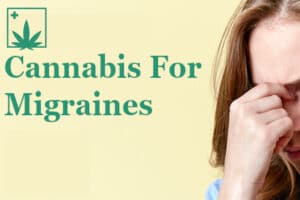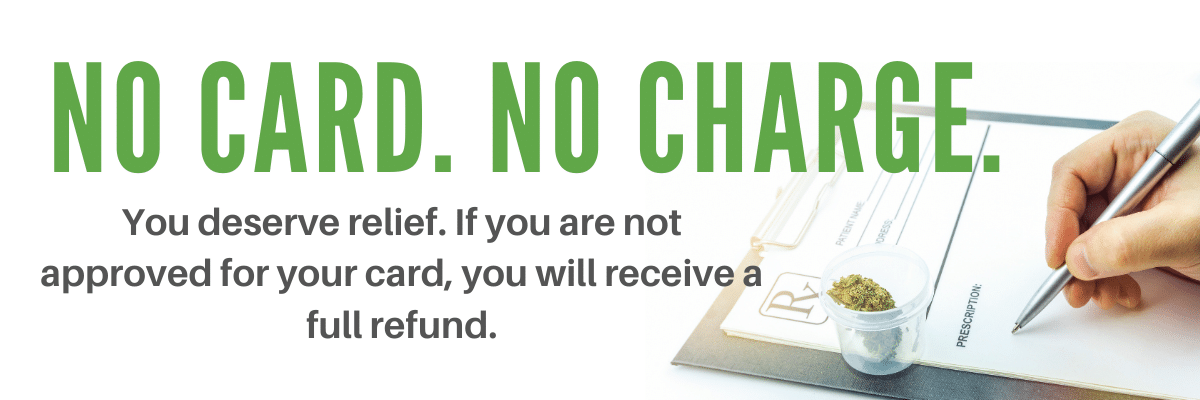

Medical marijuana for anxiety in Ohio
How Ohioans suffering from anxiety might be able to get an Ohio medical marijuana card by being diagnosed with PTSD or other anxiety-producing disorder.
How medical marijuana is used to treat anxiety disorders.
Cannabis strains and delivery methods that are well-suited for treating anxiety and PTSD.
Can you get a medical marijuana card for anxiety in Ohio?
Yes, indirectly.
Unfortunately for some anxiety patients, the ailment is not one of the qualifying conditions for getting an Ohio medical marijuana card. However, there is a chance that a patient suffering from anxiety can obtain access to medical marijuana if they are diagnosed with PTSD or other anxiety-producing disorder by an Ohio-certified medical marijuana doctor.
Anxiety is actually one of the most common reasons given for using medical marijuana. And anxiety is one of the symptoms of PTSD. However, it’s not the only symptom. In order to be diagnosed with PTSD, a patient will need to meet some additional criteria which we will cover below.
In addition to a potential diagnosis of PTSD, there is another option. According to Ohio medical marijuana laws, doctors may approve patients for “any other chronic, debilitating or other medical condition” that may be alleviated by marijuana “in the professional judgment of a physician.”
Considering the above information, patients suffering from anxiety should not just assume that because anxiety is not listed among the express qualifying conditions that they are not eligible for an Ohio medical marijuana card.
What is PTSD?
PTSD is one of several anxiety disorders. Anxiety disorders are the most common mental illnesses in the U.S. That is according to the Anxiety and Depression Association of America. In fact, 15 percent of all U.S. citizens will suffer from an anxiety disorder at some point in their lives. Right now, more than 40 million adults are being treated for anxiety disorders in the U.S.
Moreover, many cases go undiagnosed and untreated. In fact, only one in three Ohioans with an anxiety disorder will actually seek medical treatment.
Several factors are believed to contribute to anxiety disorders. These include genetic predisposition, underlying medical conditions, environmental conditions, and sometimes substance abuse.
There are five types of anxiety disorders according to the US Department of Health and Human Services:
Post-Traumatic Stress Disorder (PTSD)
Generalized Anxiety Disorder (GAD)
Social Anxiety Disorder
Obsessive-Compulsive Disorder (OCD)
Panic Disorder
PTSD stands for Post Traumatic Stress Disorder. The ailment is infamous for its pervasiveness among combat veterans. However, many civilians also suffer from PTSD, especially victims of domestic abuse or other violent crimes or traumas.
In addition to generalized anxiety, symptoms of PTSD include:
Sudden feelings of panic and fear
Nightmares
Flashbacks
Irritability
Hostility
PTSD patients often exhibit behaviors such as social isolation, depression, mistrust, hypervigilance, emotional detachment, and avoidance of situations that bring back memories of the trauma.
In order to be diagnosed with PTSD, a patient must exhibit more than one of these symptoms and behaviors and have experienced some trauma in the past.
However, the constant fear of contracting Covid-19 and the stress produced by life changes due to drastic measures being implemented to combat the disease have also been known to produce PTSD-like symptoms.
How does medical marijuana help treat anxiety and PTSD?
Although PTSD is often the result of a traumatic experience, not all trauma patients develop PTSD. Many researchers believe that PTSD and other anxiety disorders might be the result of a cannabinoid deficiency.
Research has shown that PTSD patients tend to have lower levels of particular neurotransmitters involved in the fear extinction process called endocannabinoids. These cannabinoid compounds are produced naturally by our own bodies.
If this is the case, then these conditions might be relieved by supplementing the patient’s natural endocannabinoids with phytocannabinoids found in cannabis such as THC and CBD.
In particular, CBD helps to regulate the production of a hormone known as serotonin that is thought to be involved in the fear response. The production and uptake of serotonin is mediated by an endocannabinoid called anandamide. CBD has the ability to mimic the effects of anandamide and increases serotonin levels.
Because of its ability to induce feelings of euphoria, THC can also be beneficial if the patient is suffering from depression and irritability. However, it should be noted THC can exacerbate feelings of anxiety and paranoia in some patients.
For this reason, some medical marijuana experts recommend that PTSD patients avoid THC at first or use it very sparingly, and only before bedtime.
Medical marijuana strains and delivery methods commonly used to treat PTSD
Not all medical marijuana strains and delivery methods will reduce all symptoms of anxiety and PTSD for all patients. Each patient’s needs are unique.
Treatment options should be discussed with a qualified Ohio medical marijuana doctor. However, there are some strains of cannabis with which PTSD patients have reported experiencing positive results.
Strains used to treat PTSD which are high in CBD include:
CBD Mango Haze (1:1 CBD to THC ratio)
CBD Critical Cure (2:1)
Stephen Hawking Kush (5:1)
Harlequin (5:2)
ACDC (20:1)
Ringo’s Gift (24:1)
High THC strains which are commonly used to treat PTSD include:
Blue Dream
OG Kush
Pineapple Express
Sour Diesel
Green Crack
Northern Lights
A variety of delivery methods are also available to medical marijuana patients.
Inhalation methods such as smoking and vaping offer the fastest onset time. This makes inhalation ideal for patients suffering from the frequent sudden onset of anxiety and panic attacks.
It should be noted, however, that smoking and vaping can cause or worsen lung conditions such as chronic bronchitis or asthma in some patients. Furthermore, determining dosage can also be difficult with inhalation methods.
Edible cannabis products have a slower onset time and provide a much lower bioavailability than smoking or vaping. However, when a sudden onset of symptoms is not a problem, such as when dealing with ongoing depression or sleeplessness, then edibles might be a better choice. Oral capsules also offer accurate dosing and a somewhat faster onset time than edibles.
Cannabinoid-infused tinctures taken sublingually (under the tongue) offer more rapid relief than edibles, as they absorb directly into the bloodstream via capillaries in the lining of the mouth rather than having to pass through the digestive system. However, the effects are shorter-lived.
Strain, dosage, and delivery method options should be discussed with a qualified medical marijuana doctor who will assess the patient’s symptoms and lifestyle to determine the ideal solution.
How to get a medical marijuana card in Ohio for PTSD and Anxiety
The first step in obtaining an Ohio medical marijuana card is to visit a state-certified medical marijuana doctor. In order to recommend medical marijuana to a patient, a physician must be licensed by the State Pharmacy Board.
The attending physician will examine the patient to confirm the presence of a qualifying medical condition.
If the patient is approved by the doctor, they must complete their registration through the OMMCP Patient & Caregiver Registry. There is a $50 registration fee.
Once the patient has received their medical marijuana card they are permitted to purchase their medicine from one of 60 state-licensed Ohio dispensaries.
To reiterate, just because anxiety is not one of the listed qualifying medical conditions for an Ohio medical marijuana card, that does not mean that anxiety patients are ineligible. They still might be eligible for a card if, in the physician’s judgment, the patient’s anxiety stems from PTSD or another condition that can be successfully treated with medical marijuana.

Get or Renew Your Ohio Medical Marijuana Card
For Ohio residents, we make it easy to connect with a certified recommending doctor to get or renew your Medical Marijuana Card.
To get started, simply fill out the patient registration form below, press submit, and your on your way to a MedCard telemedicine doctors appointment online. See if you qualify today!

Patient Registration Form


Links and resources:
- Medical marijuana in Ohio: What the law allows and prohibits
- The Endocannabinoid System and Anxiety
- Dept. of Human Health Services
- Ohio Marijuana Legalization Initiative (2020)
- Ohio Marijuana Electronic Signature Ruling
- Marijuana Moment – Ohio Senate Votes To Expand Marijuana Decriminalization To Cover 200 Grams
- Ohio Guide to Legal Hemp CBD
- Anxiety and Depression Association of America
- MedCard CBD: Anxiety
- Medical News Today: Can CBD oil help anxiety? What you need to know
- Sandusky Register: Ohio may not be ready to enter the world of legal pot







